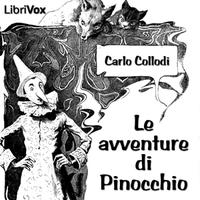CHAPTER 8
[Geppetto makes Pinocchio a new pair of feet, and sells his coat to buy him an A-B-C book]
The Marionette, as soon as his hunger was appeased, started to grumble and cry that he wanted a new pair of feet.
But Mastro Geppetto, in order to punish him for his mischief, let him alone the whole morning. After dinner he said to him:
"Why should I make your feet over again? To see you run away from home once more?" "I promise you," answered the Marionette, sobbing, "that from now on I'll be good--" "Boys always promise that when they want something," said Geppetto. "I promise to go to school every day, to study, and to succeed--" "Boys always sing that song when they want their own will." "But I am not like other boys! I am better than all of them and I always tell the truth. I promise you, Father, that I'll learn a trade, and I'll be the comfort and staff of your old age." Geppetto, though trying to look very stern, felt his eyes fill with tears and his heart soften when he saw Pinocchio so unhappy. He said no more, but taking his tools and two pieces of wood, he set to work diligently.
In less than an hour the feet were finished, two slender, nimble little feet, strong and quick, modeled as if by an artist's hands. "Close your eyes and sleep!" Geppetto then said to the Marionette.
Pinocchio closed his eyes and pretended to be asleep, while Geppetto stuck on the two feet with a bit of glue melted in an eggshell, doing his work so well that the joint could hardly be seen.
As soon as the Marionette felt his new feet, he gave one leap from the table and started to skip and jump around, as if he had lost his head from very joy.
"To show you how grateful I am to you, Father, I'll go to school now. But to go to school I need a suit of clothes." Geppetto did not have a penny in his pocket, so he made his son a little suit of flowered paper, a pair of shoes from the bark of a tree, and a tiny cap from a bit of dough.
Pinocchio ran to look at himself in a bowl of water, and he felt so happy that he said proudly:
"Now I look like a gentleman." "Truly," answered Geppetto. "But remember that fine clothes do not make the man unless they be neat and clean." "Very true," answered Pinocchio, "but, in order to go to school, I still need something very important." "What is it?" "An A-B-C book." "To be sure! But how shall we get it?" "That's easy. We'll go to a bookstore and buy it." "And the money?" "I have none." "Neither have I," said the old man sadly. Pinocchio, although a happy boy always, became sad and downcast at these words. When poverty shows itself, even mischievous boys understand what it means.
"What does it matter, after all?" cried Geppetto all at once, as he jumped up from his chair. Putting on his old coat, full of darns and patches, he ran out of the house without another word.
After a while he returned. In his hands he had the A-B-C book for his son, but the old coat was gone. The poor fellow was in his shirt sleeves and the day was cold.
"Where's your coat, Father?" "I have sold it." "Why did you sell your coat?" "It was too warm." Pinocchio understood the answer in a twinkling, and, unable to restrain his tears, he jumped on his father's neck and kissed him over and over.

